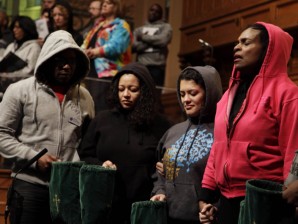‘Hoodie’ jackets in focus after US teen’s shooting
WASHINGTON—Until just a few weeks ago, the “hoodie” was seen as just another article of clothing, a favorite garment of rumpled American teenagers and casually clad vacationers.

Senior Minister Jacqueline Lewis, right, prays with other congregants during a service at Middle Collegiate Church in New York, Sunday, March 25, 2012. Church-goers were invited to wear hoodies to services to show their support for justice in the case of Trayvon Martin, an unarmed black teenager who was wearing a hoodie on the night he was killed by a neighborhood watch captain in Florida. AP PHOTO/SETH WENIG
But the popular cloth jacket with attached hood has become a subject of controversy — as well as a badge of protest and outrage — following the fatal shooting in late February of a hoodie-wearing African-American youth by a community watch volunteer.
Since the death last month of 17-year-old Trayvon Martin, there have been scores of protests across the United States — many with hoodie-wearing demonstrators — demanding justice for the slain youth.
Protesters have been calling for the arrest and prosecution of the shooter George Zimmerman, against whom police in the Florida town of Sanford have so far decided not to press charges.
This past week, US Congressman Bobby Rush staged one of the most visible protests, removing his suit jacket on the floor of the House of Representatives to reveal a hoodie and lifting the hood over his head. He also put on a pair of sunglasses.
“Racial profiling has to stop,” he declared on the House floor.
Article continues after this advertisement“Just because someone wears a hoodie does not make them a hoodlum,” he said, before being escorted out of the chamber for violating the congressional dress code that bars lawmakers from wearing hats on the floor.
Article continues after this advertisementThere was a similar protest in California’s state legislature when lawmakers in the capital Sacramento donned hoodies to urge the federal government to conduct a thorough probe of the shooting.
Martin’s fatal shooting has become another flashpoint in America’s recurring debate over race and colorblindness — or the lack of it — in the US criminal justice system.
Many African Americans and civil rights leaders have called it a case of racial profiling: In calls to a police emergency number on the night of the shooting, Zimmerman, 28, described a black male wearing a hoodie and looking “real suspicious.”
Geraldo Rivera, a Fox News commentator, said that Martin died because of what he was wearing.
“His hoodie killed Trayvon Martin as surely as George Zimmerman did,” the journalist said, arguing that a “kid of color” wearing a hoodie ignites certain feelings of “scorn” and “menace.”
California Assemblyman Steven Bradford, who took part in the protest by lawmakers there, said that a double standard is at work.
“How can a young man with nothing more than candy in his hand and a soft drink be gunned down and now be accused of causing his death simply by what he was wearing?” he said, referring to how Martin had just bought Skittles fruit-flavored sweets and iced tea before the killing.
Angel Harris, a professor of sociology at Princeton University, said while Martin likely was singled out for his skin color, the hoodie he was wearing might also have been a factor.
“It’s what has come to be associated with urban black youth,” Harris told AFP. “When a black young person is dressed in that manner, it triggers the stereotypes and perceptions — high poverty, crime, things like that.
“A larger dialogue needs to be had about the nature of stereotyping, and people’s own unconscious biases,” he said.
Johns Hopkins University professor Lester Spence said the hoodie has galvanized public attention — both positive and negative — because it is a graphic, yet readily accessible symbol.
But he said it would be simplistic to think that the hoodie trumps the issue of race in this incident.
“It wasn’t the article of clothing. When (Zimmerman) called (police) about suspicious people, he was calling about black people. Then the issue becomes that we attach the hoodie to race after the fact,” he said.
“This is part of a long history of taking articles of clothing or certain stylistic aspects and attaching meaning to them,” he said, adding that people have taken offense at other fashions or hairstyles associated with blacks — like Afros in the 1960s or low-slung pants worn by youth today.
Since the shooting, a host of American celebrities of all races have turned up photographed in hoodies in solidarity with those calling for Zimmerman’s arrest.
Miami Heat star player Dwyane Wade posted a picture of himself on his Facebook page wearing a hoodie. His teammate LeBron James posted a picture of the entire team in hooded sweatshirts with the Twitter post, “#WeAreTrayvonMartin #Hoodies #Stereotyped #WeWantJustice.”
Noted Miami Herald newspaper columnist Leonard Pitts said he fails to see anything uniquely black in the hooded sweatshirt “worn by black, white, male, female, young, old, college kids and street kids.”
“Martin wore his against a persistent drizzle as he walked home from 7-Eleven,” Pitts wrote. “Shall we restrict them to umbrellas from now on?”